AMA (Ask Me Anything) with Bryan Falchuk, best-selling author, key level senior executive, Inc. Magazine contributor, and former MBB consultant. In this interview, Bryan shares his perspectives on what makes a great consultant and highlights defining moments in his own career journey.
We also discuss Bryan’s concepts on the creative escape and the importance of a side hustle, his “must have-must not have” concept on decision making, and how he prioritized his own health and family life to lose over 100 pounds.
Listen to the Episode Here:
Podcast: Play in new window | Download | Embed
Subscribe: Apple Podcasts | Email | TuneIn | RSS | More
I’m super excited to bringing you episode 30 where we will be doing a segment that I call AMAs, or Ask me Anything. If this is your first time tuning in, AMAs are interviews when I have the utmost pleasure of connecting with seasoned or former consultants and they give you advice. Our guest is Bryan Falchuk. Bryan is actually a best-selling author. He’s a key level executive as well as an Inc. Magazine columnist. He’s also a former MBB consultant. I chose Bryan’s interview for our second episode kicking off 2018 because we cover just a wide variety of topics. In this conversation, Bryan talks a little bit about his career journey at consulting. He talks about crossroads he encountered, how he’s defined work-life balance, as well as we talk a little bit about health and wellness. He shares his weight loss journey. It just seemed like the really right inspirational discussion to help you continue to catapult your journey to greatness going into 2018 and beyond. I’m glad we’ve got a chance to connect with Bryan. I hope you will enjoy my conversation with him.
I’m also excited I got a chance to hold my very first book. I got the first hard copy of my book, The MECE Muse. That was such a great moment. I wanted to just share it with all of my go-getters. As a person that’s written a book, being able to go through the journey of writing a book, it took over three years for me to write the book, to publish the book. Nothing caps off that moment than to actually hold the real book in your hands. To me, that was just such a surreal moment and it’s just so exciting. If you’re in consulting right now, you know how much work it is, how hard it is to be a consultant. I am absolutely thrilled that I will be able to share some of my secrets, the unwritten rules I’ve learned, the practices, the habits that I’ve learned of being a consultant. I’m happy. I cannot wait to share them with the world. This is just fifteen years coming but I’m super excited this moment is here. If you want to learn more, we launched a new website for the book. You can go to MeceMuse.us. There you can get a little bit more insight about the book. Actually, we’ve got some early reviews that have come in. That’s been really great. Check that out. Bryan also has a really cool book. It’s called Do a Day. He talks a little bit about the habits and he talks about his weight loss journey as well. Check that out.
Interview with Bryan Falchuk
I’m super excited to welcome Bryan Falchuk to the show. Bryan, thank you so much for making time for the MECE Muse Unplugged. How are you doing?
I’m doing great. Thanks so much for having me.
Maybe you can introduce yourself to the go-getters of the MECE Muse Unplugged.
I started my career in an insurance company but I was a consultant there. I got out of undergrad and studied economics like a lot of people who think about going into consulting. I ended up in an insurance company because they had this internal strategy consulting career track and department in Boston, which is where I grew up so I wanted to be back there. It looked really interesting. I wasn’t really thinking about insurance per se but next thing I knew, I just clicked with the industry. I did four years there: two in the strategy team and two out in one of the business units that I had done a lot of consulting work for. I was an internal consultant, then an internal, internal consultant. Pretty quickly, I found myself wanting more and realizing that out in the corporate world that are really large company, a lot of times you get stuck and you can’t just move on to the next role because they have requirements for advanced degrees or number of years of experience. I decided I really needed to go get my MBA and more importantly, I wanted to get my MBA because I wanted to push my career faster than it was going to go otherwise.
I applied to a bunch of schools. I went to a great MBA program and that opened up some really amazing opportunities with some brand name consulting shops. I spent my summer then went full-time back to the same major consulting company. I did a lot of work for insurance companies, which wasn’t really the intention but I was good at it and I knew the space. I realized I was going to move a lot faster in the consulting company if I did that just by focusing on my expertise. It’s not the normal course especially for people coming straight out of their MBAs. The firms often will push you to generalize more and run yourself out. I totally understand the benefit of that but I was also thinking about, “Do I have it in me to stay until partner? If I don’t, I really need to move as quickly as I can and build up my capabilities and my client relationships and all that stuff so I have opportunities to move out,” because I wanted to be a present father and husband. I didn’t want to be calling in for bedtime every night from the road.
That really led me to shooting through the insurance practice at this firm. I ended up with a pretty amazing offer after a couple of years to join what was a startup in the US but a British insurance company’s US business. It was such an amazing chance to take everything I had been preaching and learning through my MBA and my consulting experience and actually be the one to go and do it. That started a different career path for me on the corporate side not as a consultant anymore. I’ve done really well through that. I’ve been at three different companies since then. Ups and downs and good and bad but I’m currently Chief Claims Officer for another British insurance company, not the same one. My career has done really well. If there’s one pivotal thing that contributed to it, it’s my time in consulting. That clearly changed my trajectory.
Your background is so rich. It’s nice to see that you had the experience before you went to B-school then got into consulting, that then catapulted you into executive roles in a particular industry. It seems so purposeful. Do you think it was or it was more happenstance for you?
I think at the time I felt it was more like, “This is what’s happening now.” As I look back on it, I do see how it ties together. Definitely my focus on insurance coming out of B-school, that was purposeful. I got engaged when I was a summer intern. It didn’t take me two months to get engaged. My fiancée at the time, my wife now, she also worked at a consulting company in the recruiting side and she was like, “I can’t be married to someone whose lifestyle is like this. I don’t want to raise a family alone.” That was fine with me because I wasn’t necessarily in it to make partner, but that was something that the firms really pushed hard. It was like, “You can make it work, the work-life balance. You just cut off from the team and go home and do dinner and bedtime with your kids, then you just get back online.”
The reality is I think it’s just a values question. If your values are such that you can do that, then you can do that. Mine weren’t. For me, I knew I needed to have a more accelerated path. I left a little bit sooner than I had thought I would leave but this opportunity came up. This was happenstance. I wasn’t really looking to leave. I wasn’t really interested in it but I was like, “I should start to think about it and I should maybe practice interviewing and see what’s out there.” Through that process, that’s the first thing that came up. I was so blown away by the opportunity and I was making all these connections with what my skill set was and what my training had been as a consultant. I just found myself so unbelievably excited for the role. That’s why I ended up leaving a little bit earlier than I planned to leave. It just happened that way but it was definitely the right move and it had purpose. It just wasn’t always clear in the moment.
Sometimes you do take a look back and it’s like, “It did come together really nicely.” As I hear you talk about it, it definitely sounds purposeful. During your time in consulting, you worked specifically in MBB type of firms. What, for you Bryan, makes a great consultant from your time in that space?

It’s a really interesting question that I get from a lot of people because there’s this presumption that it’s one kind of background or one style of person. This is going to depend on the shop a bit, whether there’s more diversity of thought and style. From my perspective, what made for a really good consultant was someone who was just curious and could apply that curiosity. You want to know more. You want to get into the problems. You know how to go about playing through that curiosity creatively, in a structured way, in a way that other people can understand so you bring it to bare for a better outcome. There’s a personality trait that I think is really crucial in that not just the curiosity but humility or humbleness. If I looked back on the people I worked with, who do I think were really amazing? It’s the people who didn’t have any airs about them. They weren’t trying to prove anything. They just really were super interested in the issues that they were facing and wanted to get to the best answer possible. The ones who I thought less of were probably the more cookie cutter, stereotypical, “This is what a consultant’s background looks like.” They were clearly more about politics and positioning in how they appeared even if it meant stepping on someone else.
One thing I learned through my career is those people might get ahead in the short term but in the long term, they tend not to. The ones who might be a little bit quieter and maybe are just more interested in the work, ultimately things generally will end up playing out better for them. It’s not about whether you’re introverted or extroverted, whether you keep to yourself or whether you’re always trying to get attention or anything like that. It’s the people who genuinely care about the work and solving the problems and getting a better outcome without worrying as much about their position, “We’ve got to this answer,” versus “I did this in the slide deck or I solved this problem for them.” It’s like, “There was a team of six other people. Did you even remember that you were working with them?” The people who were part of a team, getting to a better overall position for the client, willing to set their work aside to help someone who they were bringing along or someone who needed their help, their teammate, even someone above them. Those were the ones who ultimately to me were much better consultants, did better work and ultimately ended up doing better in their career.
I have one more question just about your background in general. I was doing a little bit of research and I noticed that when you went to B-school, you were very actively involved in a lot of different clubs. If you think about fast-forward now, for the go-getters out there that may be listening to this that are in B-school or thinking about going to B-school, how would you leverage those B-school clubs? If so, how did they help you out in terms of your journey?
I would say it’s a lot like applying to college. It’s like the extra-curriculars that’s where the clubs come in. You can think of it as a way of rounding yourself out as a candidate for other things, as a person building your network. I was actively involved in two clubs like we all were. You go around on the club sign-up day and anything that interests you, you sign up for. In business school, some people are focused on their career. There’s absolutely a piece of that that’s what can you do to bolster your resume if you’re going to apply for something that maybe you don’t have a background in or you think that you wouldn’t really do well for or maybe they wouldn’t look at you as someone who should apply for it. For example, I’m a car nut and I didn’t go to business school to become a consultant because I’ve been a consultant. I went to business school with this dream of pivoting and doing product strategy for a car company. If I could have anything, that’s what I want to do. The reality is a guy from an insurance company, the closest I got to a car other than being interested in them is I owned a car, and that’s not enough of a qualification.
Along with a classmate of mine who had worked for General Motors, he ran one of their plants in China, which is definitely a valuable experience if you want to work in the car industry. We started a car club. We both had an interest in it. We knew there were others who had an interest in it and we were interested in working in that space. If you don’t have the career credentials, you can use the clubs as a way to further your capabilities or your credentials or your clout in that space. That’s where the car club came in. I was one of the chairs of the car club so I was pretty engaged in it but time-wise, most of my time was in the consulting club and I ended up being one of the officers of it in second year. That club does more than just people sharing thoughts about consulting. It’s much more about prepping you and making you a better candidate to get into a major consulting company or a boutique or whatever you’re interested in. Members would help each other with doing case prep. We’d all give each other cases and the club would organize a trip down to Boston to see all the major consulting companies.
There are a lot of programming. They bring people in who were alumni at these consulting companies to tell you about the interview process and what the interview questions are like and do mock interviews. There’s just a huge machine of support built into the consulting club. I know the banking club was very similar. There was a marketing club that wasn’t quite as intense but definitely did a lot in a similar ‘get you ready to get a job’ thing. Then there are clubs that were more social-focused. While you’re at business school, you’re trying to get a job, but you’re also building an unbelievable network that you’re going to tap for the rest of your life.
You really should think about the social stuff too. I don’t drink, so I don’t remember what it was exactly. It was like a scotch or a whisky drinkers club and there was a beer club and there was a Toastmasters club. There were a number of other ways to get involved with your peers, which is ultimately that’s what you leave business school with. You don’t leave with, “I’m really good at reading balance sheets.” Maybe. You’ll probably have people who would do that for you soon enough in your career, so that’s not the thing that you should really be valuing when you leave. You should be valuing this unbelievably powerful and successful network that you’re going to need to tap for the rest of your life whether you realize it or not.
If we fast-forward, Bryan, I want to touch on a couple of things. You’ve got a lot of great projects that you’re working on. One is Do a Day. You’ve got a lot of content out there. Maybe you can start by just telling us a little bit about Do a Day and what motivated you to start this effort.
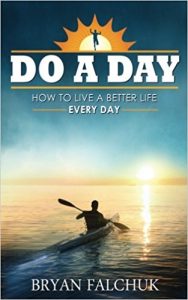
Do a Day is a book is a book that I published on March of 2017. It’s basically a way for me to share something that I’ve been living for a while and that I’ve been using on the side, coaching people and mentoring people to help them overcome challenges and live a better life. I, myself, had some pretty major challenges. I was obese as a kid and I wasn’t obese because I was eating too much. I was obese because there were things going on in my family that led to anxiety and depression and things like that. Food was an outlet and my weight followed. I learned through what I dealt with. Having overcome that, I learned the physical side of it; what you have to do physically. More importantly, I learned a lot on the emotional side. The thing that forced me to learn that was actually in 2011, my wife and I, we had a two-year-old son and she had a chronic illness. It became a really serious issue then to the point that her doctors gave up on her and she wasn’t expected to make it through the summer.
I had this really serious moment that went on for a couple of months where I was the only one earning in the family. She was a stay-at-home mom and now, it was worse than that, she was bedridden. I was home from work. My boss gave me flexibility of working from home for at least a month while we found additional care. I was losing my wife in my early 30s’. It’s one thing when you’re 90 years old, it’s another when you’re 32. I had a two-year-old son and I was a mess. Aside from not liking that part of my life, I had gained about half the weight back. I was really unhappy at work. I was unhappy with myself. I hadn’t actually dealt with the things from my childhood that led me to be obese. It all just came crashing down. I was just like, “This little boy really needs me right now and I can’t be there for him because I can’t even be there for myself.” That just brought this really unreal clarity for me in terms of purpose and motivation in a way that I had never had before. I didn’t really understand why motivation was so crucial and how to find it.
Through that moment, through the pain of it, it forced me to see things that I really needed to see. Probably being a consultant, I knew how to structure what I was seeing and put it into more of something that I could share with others. I started to transform. People were watching me, reaching out on Facebook like, “I noticed you just lost a ton of weight. You look really fit. I’ve been struggling. Could you help me out?” I started to do a lot of health and fitness coaching and it was great. What I found is if someone would come to me about like, “I need to lose 30 pounds,” or whatever it was, that’s maybe 20% of what we’d actually work on. I wasn’t overweight because I was eating too much. I was eating too much because of underlying issues. People weren’t overweight because of just eating bagels when they had them at work every day. They’re not unhappy at work because their job sucks. There’s more to it than that. I would say it’s like a gateway drug. Whatever someone called me for, that’s just one little thing that brought them in the door but the reality is we have to look at the whole picture.
Do a Day is this approach that I developed that looks at what’s going on, what drives you, what really motivates you. Using that to then transform how you approach the challenges in your life, set some real goals and just start kicking butt on them. One by one, you start achieving. The more you achieve, the more you achieve. Success leads to more success. That’s what Do a Day is about. The whole thing with it being do and day, it’s what you’re going to do today free from everything you’ve done before or haven’t done and all the judgment around that. Just because you messed up before doesn’t mean you have to right now. Also free of the anxiety of tomorrow. It’s like, “All this stuff is going to come crashing down and I have to worry about that.” It’s not crashing down today. If you sit here paralyzed because of the possibility of tomorrow, you’re not going to do what you need to do to keep it from crashing down. Free yourself from yesterday and tomorrow and do what you need to do today in pursuit of your goals. I’m really oversimplifying it, but that’s essentially what it’s about. Live free of all that anxiety and pain, find out what actually motivates you and let’s just start going and achieve.
Thank you so much for sharing your story. I’m blown away right now. I’m just listening to your story and it really touched me.
My wife is still alive, I didn’t say that. That’s really important.
I’m so thankful that you had the right support with your job and was able to take things to the next level and how this started. We don’t even have to go into the stats of how urgent it is for us to really think about that, especially in consulting where people are living on all types of crash diets and stuff. I see you have the ten principles on your website. Just talking through that from a consultant perspective, I would love to do an episode just on that.
I’m a road warrior right now as much as my wife made me promise not to be. It’s hard not to be at a level on that in the space I am. My job is not local really anymore. I’ve got a lot of experience around how do you make it work, how do you not just fall apart physically when you’re on the road, when you’re sleeping in hotel after hotel, when you’re eating on the go all the time. I’d love to talk about that.
I feel like every week someone’s talking about it somewhere, whether they’re trying to figure it out or they fell off the wagon and they’re trying to get back on. It’s a constant struggle. Congratulations all around. I’m so happy to hear your wife is doing better and you were able to lose weight and to channel all of that into something bigger with your Do a Day project.
It’s super cheesy, it would be like silver linings, but it is really true. It was incredibly hard. It still is. It’s not like she is still sick. She’s stable and she’s not on her death bed. She lives a life now and things are dramatically better. We have grown so tremendously as people. Our son has good role models for parents, whereas that wasn’t the case before. We weren’t bad people but I was miserable. There were things that were just like, “He deserved better.” It’s a shame that it took a forcing mechanism but we’ve remade our lives with purpose. He’s the most amazing kid. He’s really well-adjusted and really smart and curious and sweet. I think that a lot of it has to do with the journey that his parents have been on. It came early enough in his life and that’s what he grew up knowing. It just goes right back to Do a Day. I could sit here and be like, “It’s me. This is more than I signed up for and I have to go through this and our medical bills. What’s the future going to be like?” Or I can just be all that and I can still enjoy what’s going on today. We can still go have fun and we can still do this and we can do that. You choose ultimately how much the hardship of yesterday or tomorrow ends up ruining today. It doesn’t have to if you don’t let it.
I noticed that you’re also an Inc. Magazine contributor and you have a really cool column. One that really caught my eye, I was having this conversation with a mentee of mine and the title is called Why a Side-Hustle Could Make You More Productive. Maybe you can just tell us a little bit about the creative escape theory that you include in that article. I thought it was so insightful.
That’s not what people think of often when they think of the side-hustle. A lot of companies will tell you right upfront in the employee handbook or when you get an offer, “Moonlighting is not allowed.” They don’t want you spending your time on something else. The reality is if you’re allowed to spend your time in something else, you’re exercising your brain in a completely different way. I would really strongly suggest you do it in something you enjoy, because otherwise it’s just more work. At least let it be for something you enjoy doing. For me, I started building websites when I was in college because the internet was pretty new and no one had websites yet. I built, looking back, pretty horrible websites for pretty cheap money, but it’s good side money when I was in school. Once I got out of school, I keep that a little bit to let me buy a couple of nice little things for myself here and there. That was such a nice break from working in insurance because I did graphic design work and I learned how to do computer coding. It was a good way to let my mind work on totally different things in a different way and it was mine. My first job, I was one of 40,000 employees and I was so far from running the place and that just wasn’t even an issue, wasn’t an option, but this was all me. Those clients were my clients. The service was mine to deliver. The pricing was mine to come up with, making sure people paid. All of it, it was all on me.
I learned so many different things that I would never ever have gotten to learn ever if I had just kept working in the 9 to 5 world. That was a really early taste for me like, “This probably makes me better at my job because I’m not just feeling burnt out and I’m not feeling like I’m wasting my time. I’m never doing what I actually enjoy doing or speaking my interests.” A lot that I touched on the article is it is that creative escape and that’s really important. Our brains need that. We need time to detach. We need time to exercise. Think of the brain as a muscle. You’ve got to make it well-rounded. You’ve got to work different hemispheres and the sections of it. People who learn a second language or a third language or whatever, they tend to have more vivid dreams and they tend to be more creative as well because their brain is working and thinking in completely different ways. I’m a big fan of the side-hustle because it allows that outlet that allows for that brain development that you’re not going to get if you just do the same thing day in and day out at your poor job. That’s one of the key reasons.

The other is that the whole idea of learning new responsibilities that you’d never get to learn if you’re just an employee of other people. It’s all on you. Good and bad, success and failure, it’s all on you. That level of responsibility and authority and opportunity and weight on your shoulders will toughen you up and will teach you the good and the bad. I had a client who just would not pay. Anytime I talk to her about it, she came down on me so hard because she’s never in her entire career ever been questioned about payment. She’s seven months late on a 30-day payment, “This is ridiculous. She’s never going to pay me.” Actually in the end, she paid me about half of it. Just tell me and be like, “Actually, money is tight. I can’t afford it.” First of all, you shouldn’t be signing up for the service. Second of all, just be honest about it upfront. I wasn’t yelling at her or anything. It was amicable but that’s a lesson I learned. When you work for someone else, you just get your paycheck. Unless they go out of business, your paycheck comes every week or two weeks or whatever it is. This is a different story. You’ve got to chase people down. You learn things you’re never going to learn if you’re just doing it for someone else.
I’ve been involved in a startup. I’ve been an advisor to two startups now. It’s not apples to apples with my experience from all the various side-hustles I’ve had but I definitely learned a lot that helped me in helping them. In my time directly working at startups especially with fundraising, being able to deal with people with that level of like, “If we don’t get this money, this place is going to fold.” If you don’t get the money in your side-hustle, maybe you’ll keep the lights on because of your day job, but your side-hustle could die. It just teaches you something different, difference in the values.
I’m a fan as well. I definitely feel like some of my side projects have definitely helped create more well-roundedness. I like how you codified it. Creative escape is a really nice way to say it. Another pivot I’m going to do is you had another article on simple exercises you can do right. It had a little bit of an exercise sheet with a must-have and must-not-have exercise. I think this is a great toolkit type of article. Maybe you can share a little bit about that.
This is an exercise that someone gave me. Especially for people going into consulting, the dilemma that you’re going to have anytime you look for a job is, “Everything is possible.” As a consultant, you’re naturally a jack of all trades or you might be an expert in a function and you can apply that to lots of different spaces. I was leaving a job and was trying to look for new things. I was looking on LinkedIn, everything I saw was like, “That would be amazing. I could totally do that.” The reality is I probably couldn’t and it probably wouldn’t be as amazing as I thought. Then I send my resume in. If you’ve got an HR person who’s looking at let’s say 100 resumes and it’s at a sneaker company or something and here I am Joe Insurance, and even though I worked at a consulting company, it was largely insurance work. They were like, “We’ve got this guy who’s never worked in our space and we have 99 other people who have fifteen to twenty years of experience at all of our competitors. Let’s throw this guy’s resume out.” You’re never going to pop. I was just applying for all kinds of things that were really interesting but I had no business applying for. Most importantly, just like my comment on motivation before, I didn’t even know why I was applying to them. “Because it’s interesting.” “Why is it interesting?” If you asked me that, I couldn’t answer you. I’d probably say, “Because it’s neat.” You just said the same thing, just with a different word.
I had met the CEO of a competitor. We had a pet hunter friend in common. He was like, “You guys should really meet. You’re both ex-consultants in insurance.” We met and we hit it off. I reached out to him not for a job but just for advice. He gave me this exercise. The funny part of the story and I don’t think I put this in the article is he’s my CEO now, which is really funny the way things work out. Three, four years later, I work for him. Maybe it’s part of a master plan for him. Someone had given him that advice when he left one of the MBB shops because he was doing the same thing with every job under the sun that seemed really cool and he could tell the story of why it was a fit for him, only none of the resume screeners cared. Basically, take a sheet of paper and split it in half. On the left-hand side, write must-have. On the right-hand side, write must not have. He was like, “Then put three to five points on each side. What is it you must have and you must not have in your next job? Write it in a way that if your mother picks up the sheet, would she be able to understand what the points meant?” I was like, “I don’t want my mother reading it.” “Forget the mother part. If someone were to find it, what would they say? Would they understand? It’s not like pay. If you explain what you mean like how much pay cannot make less than X per year.” He was like, “That’s one of the rules. The points have to make standalone in a sense to use consulting speak. They can’t just be opposites of each other.” With that pay example, don’t have like, “Must make at least 100,000,” on the left and then on the right have, “Must not make less than 100,000.” You just wasted more, so don’t do that.
The most important part of it and the hardest part is challenge the heck out of your answers because they’re probably wrong. He was like, “Give it a try. Give yourself a week of challenging what you write down and then send it to me. I’m going to be really mean and you’re not going to like me.” I did that. When I sent it to him, I was like, “He’s never seen answers like this before. He’s going to be like, ‘This is great.’” He calls me up and he was like, “Bryan, remember I warned you about being mean? You need to change all of this.” I was like, “How do you know? It’s my career.” He was like, “Because you’re not actually pushing yourself.” When we got through the conversation, he was right. As the pay example, I think I had pay because we had my wife’s medical bill, so I knew there was a threshold. We couldn’t eat, have a place to live and have our stay alive. There was a threshold there, so I put a number in. He was like, “Let’s say every other point that’s on your must-have list and everything on your must not have is avoided. You hit all those things and it’s 10,000 less than what you put down, would you take it?” I was like, “Yeah.” He was like, “Then that’s either pay is not as important as you say it is, it’s not a must-have or the number is wrong. Either way, you didn’t put enough scrutiny into your answer.” I always harp on the pay one, because it’s tangible and it’s really easy for people to understand and it’s one that applies pretty broadly. Most people’s answers are unique to them. I think that’s a great way to play out how you need to challenge yourself.
I did it with someone and she had kept at this job she hated that she was leaving. She hated her boss who was super deceitful. Her hours were terrible and really inconsistent and they’d be like, “You’ll be home by 6:00,” and 10:30 at night, she’s still there. She’s working on the weekend and it’s supposed to be 9 to 5. She was like, “Never working beyond 9 to 5.” I was like, “If that’s really what you mean, let’s say you have the perfect job and it’s like, ‘We need you to stay until 6:00.’” She was like, “I’d do that.” I said, “Then it’s not this, “Never working past 9 to 5.” You need to understand why it bothers you to work past 9 to 5. It’s not the actual hours. It’s the reason why they’re asking it of you. That’s what the problem is and that’s what you should focus on for the must-have and the must not have. Otherwise, you need a retail job that has specific hours, you work the exact shift and there’s never any deviation. Or work like a receptionist job or something where it’s like, ‘These are your hours and that’s it.’ Even as a retail receptionist, they could ask you to stay late. Someone might be sick. You might need to cover. Let’s talk about when you’re okay with it and when you’re not, not just blindly, ‘Nothing outside 9 to 5.’ You’ve got to question the heck out of yourself. If you’re willing to be that tough on yourself about it, awesome.” Most people need someone else to challenge them.

I always tell people, “If you can find a friend who’s not just going to be nice, but is actually going to be like, ‘Do you really mean that? Did you push yourself on this?’ Find a friend who’s willing to push you. That will make it so much more productive.” It usually takes two to three iterations until you get to a point where it’s like, “I’m starting to understand what I really need in my next job.” What I will say is for me, when I did the exercise and this guy became my CEO when he challenged me, once I felt like it was done and I had a clear sense of it, I had two job offers in two and a half weeks. I ended up taking one of them which happened to be the wrong one, but it did lead to a really great Inc. article I wrote that got a lot of clicks. Maybe it wasn’t so bad in the end that I chose the wrong job, but I chose it for other reasons. It was local and we couldn’t move, so I had to take that one. The exercise worked. My resume popped really clearly. When they called me to talk, I was really compelling because I knew exactly why it was a good fit and I knew what I can do for them. I hooked them right from the start because I had such clarity. That’s what they’re looking for.
I think this is a perfect toolkit. I actually can even see it being applied if a person’s in between products and they have a couple of different projects that they’re looking at getting on and which one would help them. I feel like this exercise can help with that. This has been not only a good conversation, it was so inspirational, Bryan. I cannot wait to speak with you in the future. Any last remarks you have for our go-getters?
There’s something that I would raise that I think is really important. When I talk to people who are thinking about going into consulting, a lot of times they question their background and they question whether they have any shot in the world. They’re like talking themselves out of it before they even apply because they just assume it’s going to be a no because they don’t fit what they perceive to be their cookie cutter. One of the beautiful things about consulting is it’s one of the few spaces where having lots of people with different backgrounds is really, really valued. I’m not going to say it’s like that at every single shop, but for most of the consulting companies, the most important thing that they look for when they are screening job applicants or people in interviews is they’re trying to find people who are smart, who can take a complex problem, break it down and solve it.
They’re not trying to look for people who have done Fortune 500 accounting work specifically. They’re not looking for people who are electrical engineers. There’s no, “It’s only these kinds of people.” It’s one of the few industries where you get that. They’re just looking for smart people who can break down problems in a clear way, communicate it effectively and work to a solution. That takes all-comers. Before you talk yourself out of it, if you’re curious and interested and you love finding out what’s going on so you can make it better, it is a path worth pursuing. Whether you work on a farm or you work at an investment bank, it doesn’t matter. It’s all about how you think and the kind of person you are. Don’t count yourself out before you’ve given it a shot.
 Bryan, if folks want to reach out to you, how can they connect with you?
Bryan, if folks want to reach out to you, how can they connect with you?
I’ve tried to put everything on the Do a Day book website, so it’s just DoADayBook.com. There are links to my Inc. articles there and links to all my social media accounts. There’s obviously a link to buy the book and all that and more information on it. I do coaching work and public speaking. You can find all that there. I’m doing a TEDx in March in New Jersey. If you’re in that area and you want to come hear me firsthand talking about Do a Day, I’ll be doing that then. I’m super active on Twitter, which I never thought I’d say, but I have to be with all the stuff that I’m doing for my side-hustle. You can keep up with me pretty clearly if you follow me on Twitter, @newbodi is my main account.
Congratulations on the TEDx Talk. I look forward to hearing about your experience with that. Thank you so much, Bryan. I think, go-getters, you can see why I said that Bryan is the epitome of a go-getter, rightfully so. Thank you for being on the show. Thank you, my go-getters, for tuning in. This is Christie Lindor signing out for the MECE Muse Unplugged pop-up podcast. Here’s to your journey to greatness.
Links from today’s episode:
- MECE Muse book website
- Do a Day Book
- Bryan’s Blog
- Bryan’s Inc. Magazine column
- Why a side hustle could make you more productive at your job
- Must have versus must not have exercise
About Bryan Falchuk
 Bryan Falchuk is an author, public speaker, C-level executive, certified personal trainer, and behavior change specialist. He has been coaching people on how to change their lives for the better using a philosophy he developed to overcome challenges and achieve goals that he teaches in his best-selling book, Do a Day. Using Do A Day, Bryan was able to break from judgment of past mistakes and fear of the future to live a life of consistent, unending health, wellness, and success and works to share what he’s learned with others seeking a happier, more complete existence.
Bryan Falchuk is an author, public speaker, C-level executive, certified personal trainer, and behavior change specialist. He has been coaching people on how to change their lives for the better using a philosophy he developed to overcome challenges and achieve goals that he teaches in his best-selling book, Do a Day. Using Do A Day, Bryan was able to break from judgment of past mistakes and fear of the future to live a life of consistent, unending health, wellness, and success and works to share what he’s learned with others seeking a happier, more complete existence.
